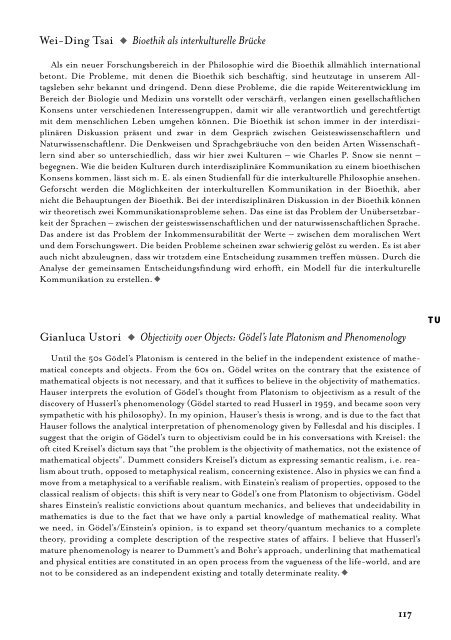Verlag.Buchhandel.Service. - Österreichische Gesellschaft für ...
Verlag.Buchhandel.Service. - Österreichische Gesellschaft für ...
Verlag.Buchhandel.Service. - Österreichische Gesellschaft für ...
Erfolgreiche ePaper selbst erstellen
Machen Sie aus Ihren PDF Publikationen ein blätterbares Flipbook mit unserer einzigartigen Google optimierten e-Paper Software.
Wei-Ding Tsai ◆ Bioethik als interkulturelle Brücke<br />
Als ein neuer Forschungsbereich in der Philosophie wird die Bioethik allmählich international<br />
betont. Die Probleme, mit denen die Bioethik sich beschäftig, sind heutzutage in unserem Alltagsleben<br />
sehr bekannt und dringend. Denn diese Probleme, die die rapide Weiterentwicklung im<br />
Bereich der Biologie und Medizin uns vorstellt oder verschärft, verlangen einen gesellschaftlichen<br />
Konsens unter verschiedenen Interessengruppen, damit wir alle verantwortlich und gerechtfertigt<br />
mit dem menschlichen Leben umgehen können. Die Bioethik ist schon immer in der interdisziplinären<br />
Diskussion präsent und zwar in dem Gespräch zwischen Geisteswissenschaftlern und<br />
Naturwissenschaftlenr. Die Denkweisen und Sprachgebräuche von den beiden Arten Wissenschaftlern<br />
sind aber so unterschiedlich, dass wir hier zwei Kulturen – wie Charles P. Snow sie nennt –<br />
begegnen. Wie die beiden Kulturen durch interdisziplinäre Kommunikation zu einem bioethischen<br />
Konsens kommen, lässt sich m. E. als einen Studienfall <strong>für</strong> die interkulturelle Philosophie ansehen.<br />
Geforscht werden die Möglichkeiten der interkulturellen Kommunikation in der Bioethik, aber<br />
nicht die Behauptungen der Bioethik. Bei der interdisziplinären Diskussion in der Bioethik können<br />
wir theoretisch zwei Kommunikationsprobleme sehen. Das eine ist das Problem der Unübersetzbarkeit<br />
der Sprachen – zwischen der geisteswissenschaftlichen und der naturwissenschaftlichen Sprache.<br />
Das andere ist das Problem der Inkommensurabilität der Werte – zwischen dem moralischen Wert<br />
und dem Forschungswert. Die beiden Probleme scheinen zwar schwierig gelöst zu werden. Es ist aber<br />
auch nicht abzuleugnen, dass wir trotzdem eine Entscheidung zusammen treffen müssen. Durch die<br />
Analyse der gemeinsamen Entscheidungsfindung wird erhofft, ein Modell <strong>für</strong> die interkulturelle<br />
Kommunikation zu erstellen. ◆<br />
Gianluca Ustori ◆ Objectivity over Objects: Gödel’s late Platonism and Phenomenology<br />
Until the 50s Gödel’s Platonism is centered in the belief in the independent existence of mathematical<br />
concepts and objects. From the 60s on, Gödel writes on the contrary that the existence of<br />
mathematical objects is not necessary, and that it suffices to believe in the objectivity of mathematics.<br />
Hauser interprets the evolution of Gödel’s thought from Platonism to objectivism as a result of the<br />
discovery of Husserl’s phenomenology (Gödel started to read Husserl in 1959, and became soon very<br />
sympathetic with his philosophy). In my opinion, Hauser’s thesis is wrong, and is due to the fact that<br />
Hauser follows the analytical interpretation of phenomenology given by Føllesdal and his disciples. I<br />
suggest that the origin of Gödel’s turn to objectivism could be in his conversations with Kreisel: the<br />
oft cited Kreisel’s dictum says that “the problem is the objectivity of mathematics, not the existence of<br />
mathematical objects”. Dummett considers Kreisel’s dictum as expressing semantic realism, i.e. realism<br />
about truth, opposed to metaphysical realism, concerning existence. Also in physics we can find a<br />
move from a metaphysical to a verifiable realism, with Einstein’s realism of properties, opposed to the<br />
classical realism of objects: this shift is very near to Gödel’s one from Platonism to objectivism. Gödel<br />
shares Einstein’s realistic convictions about quantum mechanics, and believes that undecidability in<br />
mathematics is due to the fact that we have only a partial knowledge of mathematical reality. What<br />
we need, in Gödel’s/Einstein’s opinion, is to expand set theory/quantum mechanics to a complete<br />
theory, providing a complete description of the respective states of affairs. I believe that Husserl’s<br />
mature phenomenology is nearer to Dummett’s and Bohr’s approach, underlining that mathematical<br />
and physical entities are constituted in an open process from the vagueness of the life-world, and are<br />
not to be considered as an independent existing and totally determinate reality. ◆<br />
117<br />
T U


